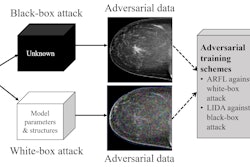Data privacy concerns steer organizational leaders from sharing public health data such as imaging for AI development, a study published on December 19 in JAMA Network Open reported.
Researchers led by Alaa Youssef, PhD, from Stanford University in interviews with these leaders also found that motivation and capabilities are the two main factors related to organizational readiness for data sharing in this area.
“The findings … suggest that data-sharing policies should be rooted in feasibility and incentivization strategies to promote responsible and equitable AI development in the healthcare sector,” Youssef and co-authors wrote.
While AI and machine learning have demonstrated improvement in clinical decision-making, data flow is needed between organizations and developers to further develop AI algorithms. One common ask of radiologists in this area is for more prospective AI studies with larger imaging datasets.
However, the researchers noted that many organizations are hesitant in sharing health data for AI. This is mainly due to organizational apprehensions and competing priorities. Youssef and colleagues also noted a gap in understanding how organizational factors impact readiness for sharing health data for AI development.
They designed a qualitative case-based study to explore health data-sharing behavior across 18 organizations. These included organizations in the sectors of academia, government, nonprofit, and private health.
The team conducted 27 semi-structured interviews with organizational leaders in data-sharing roles between 2022 and 2023. The leaders were based either in the U.S. or the U.K. All sectors reported that imaging data is collected, curated, and shared for AI development.
The researchers found that organizational readiness for data sharing center around motivation and capabilities. Motivation in this case concerns the alignment of an organization’s values with data-sharing priorities. It was also tied to engagement in data-sharing efforts, the team reported. However, it also highlighted that organizational motivation could be adjusted by external incentives for financial or reputational gains.
Organizational capabilities, meanwhile, consist of infrastructure, people, expertise, and access to data. It also entails whether an organization has the capacity to engage in and oversee data sharing due to the complexity of sharing data from multiple sites. Additionally, regulatory authorization for data sharing remains an arduous task. Organizations must have safeguards in place for the risks and consequences of data de-identification and inappropriate handling.
“Cross-sector collaboration was a key strategy to mitigate barriers to access health data,” the researchers wrote.
Based on the findings, external incentives could promote cross-sector collaborations by overcoming barriers to accessing health data for AI development, the study authors wrote.
“The findings suggest that tailored incentives may boost organizational motivation and facilitate sustainable flow of health data for AI development,” they added.
The authors also suggested that aligning health data-sharing policies with motivating incentives is important to improve data sharing.
“This alignment may help increase the sharing of health data in a way that is sustainable, responsible, and fair,” they concluded.
The full report can be found here.



















